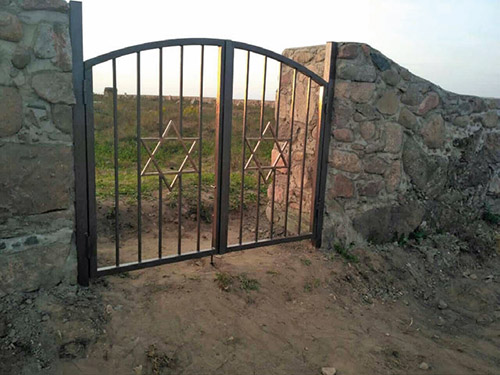



George Sokolowski, a member of Young Israel of New Rochelle, calls his trip to Europe his “Graveyard Tour.” With a desire to trace his roots and perhaps find evidence of previous generations of his family who had lived in Derechin, Belarus, Sokolwski decided to explore the town where his mother grew up and that had once been home to a community of over 4,000 people. Sokolowski was confident that there was a Jewish cemetery in the area, and maps provided by the Jewish Heritage Research Group (JHRG) in Belarus appeared to confirm his belief.
Nearly 10 years ago, in 2010, Sokolowski; his wife, Sharon; son Jonathan; and daughter-in-law, Lisa, traveled to Derechin (also spelled Dereczyn) after coordinating efforts with the JHRG. Setting out from Vilna with a local guide/interpreter and an Israeli driver, they contacted the town’s mayor who recalled that there had, indeed, been a Jewish cemetery in Derechin and confirmed its location. However, despite a number of passes through the designated location, it was nowhere to be seen. Finally, spying what appeared to be a wooded area surrounded by fields of grain, the group decided to attempt one last effort on foot. Walking through now-overgrown trees and thick underbrush, Sokolowski tripped, and looked down to discover a gravestone lying on its side. It was an emotional discovery. The cemetery, established in the late 18th century, was quite large, covering several acres.
Working with Yuri Dorn, the coordinator of the JHRG in Belarus, a nearly decade-long restoration project was begun, funded by the Sokolowski family. In the first phase, in coordination with the town administration, students from The Minsk Youth Hillel and Sochnut spent several weeks in the summer of 2011 cutting down trees and clearing the underbrush. Gravestones were righted. Local contractors were hired to rebuild and improve the original stone wall to a height of two meters, including the addition of a proper gate facing the road. This past May, 2019, Sokolowski returned to Derechin, again with his wife and son Jonathan, for a rededication ceremony, mounting a plaque on the rebuilt cemetery wall.
Sokolowski is resolute when he speaks of the importance of the cemetery’s restoration. He explained, “I want people who travel these roads to know that Jewish people lived here. It’s important to mark this location. It’s important for our history that people not forget the citizens of Derechin, the Jewish people who lived, worked and prayed in this area.”
For Sokolowski, raising awareness of the innumerable small-town Jewish cemeteries that dot Eastern Europe is of prime importance. “The chance to reclaim them is a worthy endeavor. It has given me great peace of mind to have been able to participate in the great mitzvah of honoring the memory of those who have come before us.”
The backstory of Sokolowki’s life is interesting to note. Sokolowski’s mother was born in Derechin; his father, the renowned cantor Shael Sokolowski, grew up in nearby Slonim, where he became the chazan of the Slonim Great Synagogue, built in 1642. His mother was a nurse, and a member of Betar, a socialist who spoke Russian and Polish. She joined the Russian war effort in 1939, subsequently escaped the Nazi invasion and served with the Underground Army for the duration of the war. His father was drafted into the Russian army and left the military with the rank of captain. After the war, Sokolowsi’s parents met and married in a DP camp. His mother worked as a camp nurse and his father was the camp chazan/shochet. The couple immigrated to the U.S. in 1948 when HIAS appointed Mrs. Sokolowski to care for a group of 300 orphans destined for adoption, whose parents’ families were entirely lost in the Holocaust.
Sokolowski’s father passed away when George was only 8 years old. Sadly, Sokolowski has only a brief recording of his father’s singing. However, George Sokolowski, inheriting his father’s love of chazanut, has since childhood served as a chazan on the High Holidays; music has always been a part of his world. His son Jonathan and his family also live in New Rochelle. His son Shael, named for Sokolowki’s father, and his family live in West Orange.
Discussing the importance of keeping Jewish Eastern Europen heritage alive, Sokolowski explained, “A cemetery is a matzevah (monument) to our history.” To quote from his dedication remarks, “We are gathered here together today among these gravetones and their holy remains. Simple people and Torah scholars, wealthy and poor. All together. Quiet. Without words. Witnesses to a bygone world.”
For more information, contact Yuri Dorn at www.jhrgbelarus.org� or Ruth Ellen Gruber at jhe@jewish-heritage-europe.eu.
By Yvette Finkelstein









